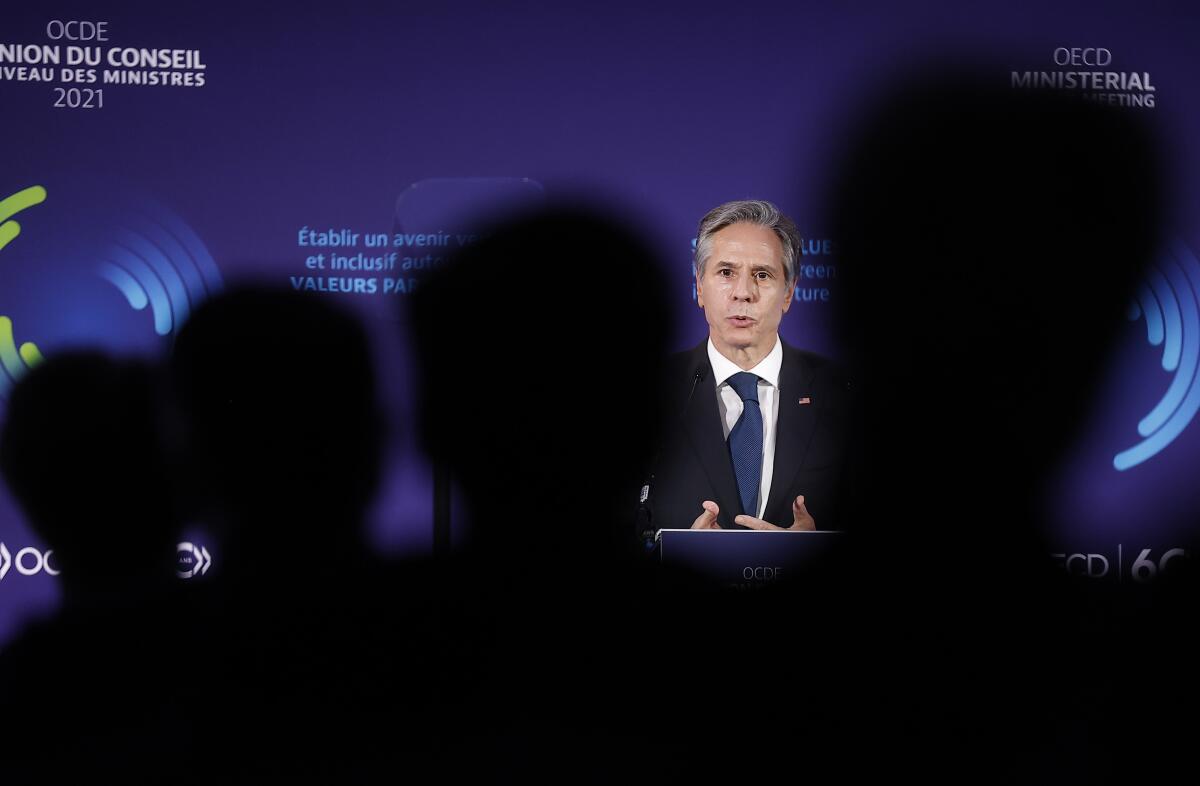Biden administration is expected to enter a new security agreement with Mexico

MEXICO CITY â Top Biden administration and Mexican government officials are expected this week to discuss overhauling a security arrangement that Mexican officials say has exacerbated violence tied to the narcotics trade.
The discussions will take place Friday in Mexico City during meetings involving a high-level delegation of U.S. officials that includes Secretary of State Antony J. Blinken, Homeland Security Secretary Alejandro N. Mayorkas and Atty. Gen. Merrick Garland, according to people familiar with the matter.
For the record:
6:40 a.m. Oct. 21, 2021This story says that the Obama administration reached an agreement in 2008 with Mexico. It was the Bush administration that cemented that deal.
âIn matters of security, there has to be a new chapter,â Mexican Foreign Minister Marcelo Ebrard told reporters here Tuesday.
The leftist government of President Andrés Manuel López Obrador has been especially contemptuous of an agreement reached in 2008 between the Obama administration and the right-wing government of former Mexican President Felipe Calderón, a bitter rival of López Obrador.
The multimillion-dollar initiative became the latticework of a vast U.S.-Mexico joint effort to fight drug trafficking, share military intelligence, revamp Mexicoâs judiciary and law enforcement agencies, and improve government accountability. Known as the Mérida Initiative, the deal has been the foundation of U.S. security policy in Mexico for more than a decade.
The agreement was heavy on hardware, military action and the so-called kingpin strategy â to kill or capture the leaders of drug cartels, hoping their organizations would fold. It didnât work out that way â the cartels had deep benches, and new leaders were frequently more violent than their predecessors, Mexican authorities have said.
It is time, Ebrard said, âto leave the Mérida Initiative behind.â Its premises are foreign to what the current Mexican government is attempting to achieve in public security, he said.
The Biden administration is amenable to making changes.
âWe believe we are due for an updated look at our bilateral security cooperation,â State Department spokesman Ned Price said Thursday. But he said the Mérida plan made gains in terms of the rule of law, human rights and other crime-fighting strategies that should be conserved.
âWe want to see to it that those gains are preserved, that that cooperation is deepened, and that we have an updated approach that accounts for the threats of today,â Price said.
The emerging security strategy has not been detailed, and authorities on both sides of the border face a daunting task: Violence and murder rates across Mexico have soared in recent years, whether related to drug trafficking, human smuggling or street crime.
People familiar with U.S.-Mexico discussions said a new deal would take more targeted aim at the most dangerous drug cartels and migrant smugglers. It would also focus on the cartelsâ finances and activities in the United States.
Mexico is asking the U.S. to extradite more suspects, the sources said, in hopes of more forcefully asserting its sovereignty. Most extraditions currently go north from Mexico to the U.S., not the other way around.
Mexican officials are also sure to press the U.S. to stanch the flow of firearms being smuggled into their country. About 70% of all weapons confiscated in Mexico can be traced to U.S. sources, Mexican officials have said.
The U.S., meanwhile, hopes that Mexico will stiffen resistance to smugglers to reduce the arrivals of migrants at the nationsâ shared border, where the numbers seeking to enter the U.S. have broken records in recent months.
The Trump and Biden administrations have pressured Mexico to block the flow of people from Central America to the United States. Mexicoâs record on that score has been spotty, and in recent weeks U.S. officials scrambled to handle a large number of Haitian migrants in Del Rio, Texas.
The U.S. officials are also expected to seek Mexicoâs help in curbing illicit shipments to the U.S. of fentanyl, a powerful and often deadly synthetic opioid.
Outside experts have said the new framework is badly needed because U.S. and Mexican officials are deeply unsatisfied with how the Mérida Initiative has been working.
âThe U.S. side recognizes that a once-strong cooperation has been in decline,â said Andrew Selee, a Mexico expert who is president of the Migration Policy Institute in Washington. âIt needs new energy.â
Roberta Jacobson, a former U.S. ambassador to Mexico and former top State Department official for Latin America, agrees Mérida has become outdated but believes it had success until recent changes.
âThis cooperation has eroded in recent years, and with it the utility of Mérida,â she said during an online chat with the Inter-American Dialogue.
Nevertheless, she said, the agreement created an unprecedented and valuable âculture of cooperation.â
âMexico and the United States must redefine their security priorities for a new binational strategy â one that respects sovereignty and responds to the actual causes of insecurity,â she said.
The troubled security partnership hit a low point last year when the U.S. arrested former Mexican Defense Minister Salvador Cienfuegos on drug trafficking charges as he traveled in California.
Mexican officials said they were not informed of the arrest and protested vehemently. Eventually, the U.S. relented and sent Cienfuegos to Mexico, releasing him without charges, and Mexico imposed new restrictions on the ability of foreign agents to operate in Mexico.
Blinken and his colleagues will have to tackle that lingering mistrust, said Andrew Rudman, head of the Mexico Institute at the Wilson Center, a nonpartisan think tank in Washington.
âConfidence and trust have to be restored,â he said. âThe most important thing is theyâre talking, restoring a dialogue after so much damage.â
Times staff writer Wilkinson reported from Washington and special correspondent Sanchez from Mexico City.
More to Read
Get the L.A. Times Politics newsletter
Deeply reported insights into legislation, politics and policy from Sacramento, Washington and beyond. In your inbox three times per week.
You may occasionally receive promotional content from the Los Angeles Times.











